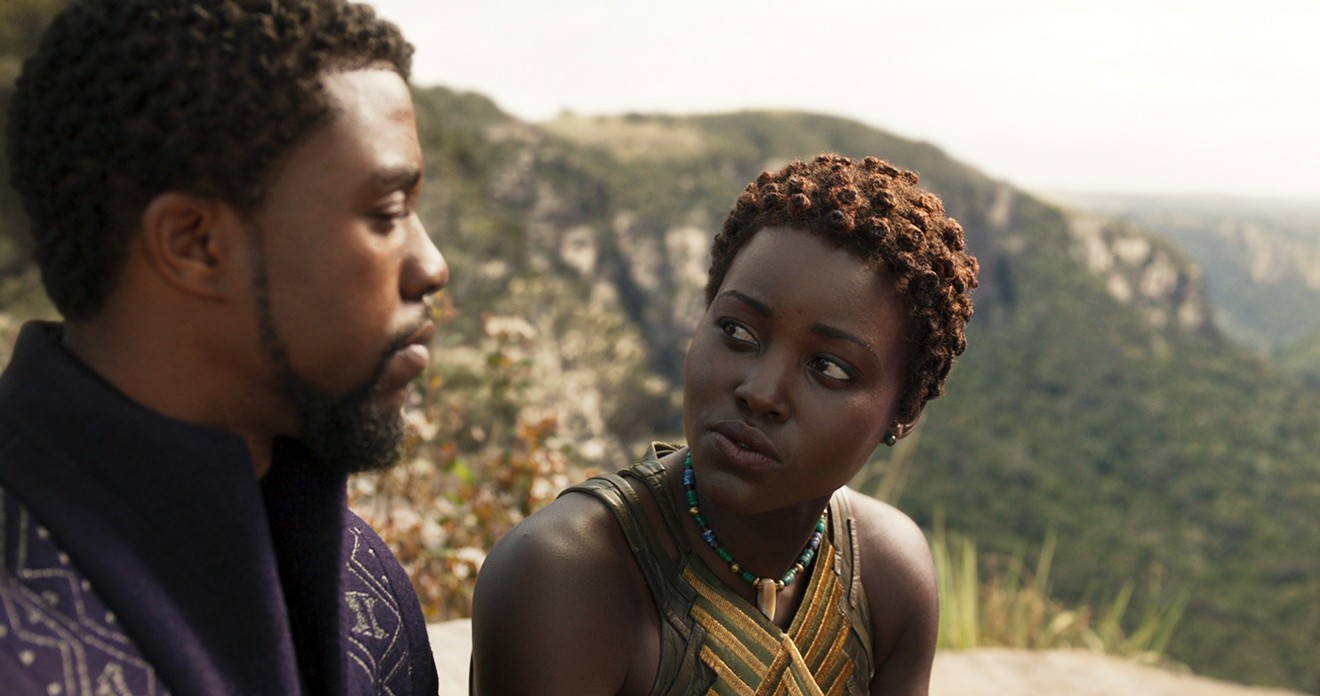It’s a great relief to confirm that Black Panther is genuinely worth rooting for, a clear standout on Marvel’s roster — and certainly on track for box-office success. It’s only Ryan Coogler’s third feature — and an ambitious leap from his impressive 2013 debut Fruitvale Station and his critically acclaimed Rocky franchise entry Creed (2015) — but Black Panther is executed with the confidence of a far more experienced filmmaker. Coogler and his team have conjured a universe and fleshed out its players, one existing (honestly, thriving) in the even bigger cinematic universe that is Marvel. It’s a case of the right story landing in the right hands. As with Creed, Coogler again freshens up a stale formula, making something familiar not just relevant but urgent. (Case in point: When Black Panther’s sister roasts his traditional sandals with a 3-years-late joke based on the “What are those?” meme, before gifting him with high-tech sneakers, the line is delivered with such earnest glee that it doesn’t even feel out of touch.)
Chadwick Boseman plays King T’Challa, aka the Black Panther, a monarch and superhero who hails from the fictional country Wakanda, an African tech-utopia that has never been conquered and is uniquely rich. The source of its material wealth is a Marvel-magic resource called vibranium. This Edenic world is fully realized on screen thanks to Hannah Beachler’s paradisiacal production design and Ruth E. Carter’s traditional-meets-futuristic costume design. And it’s captured by Coogler’s Fruitvale Station director of photography Rachel Morrison, who just made history by becoming the first woman to be nominated for the Academy Award for cinematography for her work on Dee Rees’ Mudbound. Morrison is adept not just at superhero spectacle but at illuminating and photographing, for clarity and beauty, the skin tones of a cast full of actors of color that includes rising newcomers and veterans like Angela Bassett and Forest Whitaker.
Newcomer Wright, especially, is a revelation — she’s got the spunk, the punchlines, the outfits and the heart.
tweet this
At first, thanks to a cleverly deceptive storyline, Black Panther may lead you to believe the big battle will involve defeating the caricature-like evil white guy, Ulysses Klaue, played by Andy Serkis, appearing in his human form rather than through motion capture, with a good dash of Eurotrash. Klaue is an arms dealer whose trickster ways lead T’Challa and his squad of women on an undercover mission to a Busan, South Korea, casino — and a fight sequence more 007 than Marvel. Watching the female warriors fight together — the general Okoye (Danai Gurira), spy Nakia (Lupita Nyong’o), and T’Challa’s tech-savvy younger sister Shuri (Letitia Wright) — I couldn’t help but think how the three would justify a Charlie’s Angels reboot. Black Panther goes full Fast and Furious in the car chase that follows, on the streets of the practically undrivable Busan, where the alleys are narrow and the foot traffic busy. As T’Challa ditches his exquisitely tailored jacket for his Black Panther suit and starts climbing neon-coated buildings with feline ease, the women, clad in fancy gowns and barefoot-driving at electric speed, step up to the spotlight.
Their screen time marks the best parts of the film. At times, the actresses’ charisma overwhelms Boseman’s. That’s partly in character, as T’Challa is a king who thinks of and serves his people, the kind of monarch who puts the kingdom first. In that regard, Black Panther is smart to give equally exhilarating fighting scenes for the Dora Milaje (Wakanda’s female bodyguards) as it does for Black Panther himself. Newcomer Wright, especially, is a revelation — she’s got the spunk, the punchlines, the outfits and the heart.
Boseman’s star power is further tested when Serkis’ storyline is cast aside to make room for the actual villain — Klaue’s sycophant, Erik Killmonger (Michael B. Jordan), who not only nearly steals the throne, but also steals the show. Jordan, who has starred in all of Coogler’s features, is a magnetic presence, and his portrayal marks a refreshing departure from the cartoonish Klaue. Like all the best antagonists, Killmonger has an agenda we can empathize with (he wants to avenge his father’s death), and his arrival in Wakanda inspires the nation to question how they’ve been so private with their riches, living comfortably without helping other oppressed black people throughout history. Coogler gives the villain’s backstory as much thought as the protagonists’; at one point, I even wondered if the big twist was that Jordan’s Killmonger would actually prove to be the rightful heir to the throne. Because the character has depth, the big fight at the end — as Wakandans face off against each other — never feels senseless or trivial.
Still, Boseman is an actor with a lived wisdom on his face, fit for the role of this king-slash-superhero. Written by Coogler and Joe Robert Cole, Black Panther brings grounded history — in Black History Month, no less — to a fantastical story, carefully considering the world in which the characters reside. There are generations of consequences at play here, and T’Challa must make weighted political decisions — for his people, for other black people outside Wakanda, for the world. Just as Spider-Man’s uncle famously said, “with great power comes great responsibility,” T’Challa, too, is told by his father: “It’s hard for a good man to be king.”











